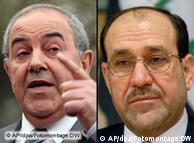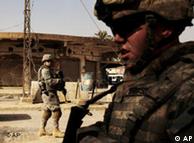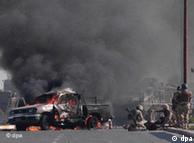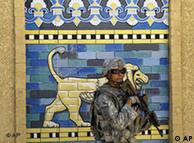IRAQ | 19.08.2010
Iraq faces increasingly uncertain future as US troops withdraw
Iraqis have been looking forward to the day when United States forces pack up and go home ever since the 2003 invasion led to 150,000 US soldiers being deployed in their country.
They've been living with an occupying army for over seven years. Even after sovereignty and the responsibility of governance were returned to Baghdad, US forces remained. Many Iraqis who were happy to have seen the dictator Saddam Hussein removed by the Americans soon came to resent the continued US presence. Many blamed them for the instability which followed Saddam's demise. To this day, most hold Washington largely responsible for the lack of basic services and the insecurity that continues to make everyday life in Iraq a dangerous struggle.
Strangely enough there is a growing chorus of voices being raised in concern now that the Americans are actually leaving.
The United States has been slowly withdrawing its forces from Iraq for months as part of President Obama's commitment to bring US combat troops home by 2011. With the last combat brigades crossing into Kuwait on Thursday, 50,000 troops will remain behind in 94 bases. With just a third of the invasion force left and with only a year to go before the US 'status of forces' agreement with Iraq runs out, Iraqis should be planning their street parties.
And yet, there is a growing air of trepidation as the troops leave and an even more concerned eye looking toward the final pullout date in 2011.
Iraqis grow nervous as final pull-out date gets closer
 Presidential rivals Ayad Allawi and Nuri al-Maliki fight on
Presidential rivals Ayad Allawi and Nuri al-Maliki fight on
With the political situation in Iraq still unresolved some six months after disputed presidential elections paralyzed the country's government and with terrorist and insurgent attacks making the July 2010 death toll of 525 the highest in two years, the thought of a dramatic reduction in US personnel is making some Iraqis nervous.
"US combat troops leave Iraq in a state of political paralysis following the March 2010 parliamentary elections, and a precarious and fragile 'stability' predicated more on an uneasy maintenance of a status quo than on any durable or sustainable gains in security," Dr. Kristian Ulrichsen, an Iraq expert at the London School of Economics and Political Science, told Deutsche Welle.
"In this sense both the political and security situations are extremely fragile and could be reversed by any number of issues which remain unresolved; such as the future of power-sharing arrangements on federal and regional levels, the sharing and redistribution of oil revenues, the disarmament, demobilisation and reintegration of militia groups, questions of minority rights and representation, and above all, the status of Kirkuk and other disputed areas."
Nadim Shehadi, an Iraq expert at the Middle East programme at Chatham House, believes the US withdrawal may create a new power struggle in Iraq.
"The danger in setting a timetable rather than benchmarks for withdrawal is that the temptation to take the credit for the withdrawal is irresistible," Shehadi told Deutsche Welle.
"So when the US withdraws or reaches a point when it cannot reverse its decision there will probably be some organization that will start positioning itself as the liberator or the resistance to the US occupation and take the credit for the withdrawal. Then the order left by the US risks to be overthrown: There is only one thing worse than having the US as your enemy and that is to have the US as your friend - this will be the scenario when the US withdraws."
Fear heighten over removal of US buffer in internal feuds
Even the country's military leaders are concerned that the 2011 end date is coming too fast for Iraq's security forces. Lieutenant General Babaker Zebari, Iraq's most senior military commander, has even mooted the possibility of US forces staying on until 2020, a date when Iraqi forces are expected to be fully ready.
 US troops have acted as buffers in regional feuds
US troops have acted as buffers in regional feuds
"The main calls for continued US troop deployment in Iraq have come from Kurdish officials such as Zebari who have many reasons for wanting the US military to remain in position," Ulrichsen said.
"Regular clashes between Kurdish Peshmerga militia and the Iraqi military have occurred. In almost every instance, the US has sided with the Kurdish Regional Government in political and military affairs, and Kurdish leaders fear that the loss of their powerful external protector will leave them alone to face the Iraqi central government which may attempt to reassert centralized political and military control throughout all Iraqi territorial boundaries. That could threaten civil war."
"There's a risk of fighting between Shia and Sunni factions restarting when the US leaves but probably the single biggest concern is violence between the Arabs and the Kurds," Richard Gowan, an Iraq expert with the European Council for Foreign Affairs, told Deutsche Welle.
"The US is leaving behind command systems that would allow American combat forces to redeploy to the Arab-Kurdish boundary areas in northern Iraq," he added. "One scenario is that the US will be able to use diplomacy and its residual military presence to deter violence. The second is that there'll be growing strife between the Arabs and Kurds. The most worrying scenario is that rising violence could lead Turkey to intervene militarily, given its own concerns over Kurdish separatism."
US commanders and strategists have also privately considered the possibility of staying on in Iraq, especially when the Iraqi Army is so obviously incapable of repelling an external attack, battling the Kurds in the north or keeping al Qaeda or other militant groups from taking advantage of sectarian rivalries and over-running the country.
Despite this, it is unlikely President Obama will sanction any extension to the deployment of US troops in Iraq. There is far too much at stake politically for the US president to renege on one of his strongest promises. Obama's credibility is at stake not only over the assurances he made to US citizens to bring the troops home but also to the agreement he made with the people of Iraq.
"With deadlock over the formation of a new government, and disputes over the number of people killed this summer, there's a real fear that political differences could inspire a new wave of violence," Richard Gowan said. "The growing tensions with neighbouring Iran, which has huge leverage in Iraq, increase these concerns."
Leaving Iraq job unfinished could lead to wider instability
 Increased attacks suggest Iraq could easily be destabilized
Increased attacks suggest Iraq could easily be destabilized
However, by committing to his own deadlines and fulfilling his promises, some experts say Obama is cutting out of Iraq with the job unfinished and that the US is leaving Iraq in such a parlous situation that the country could destabilize the wider region, making it a state of concern much like in the days of Saddam Hussein.
"The US-led occupation has left Iraq with a divisive and dysfunctional political process in which considerations of good governance and effective institutionalisation have been subordinated to external political interests in the US," Kristian Ulrichsen said.
"The Iraq the US created and leaves behind is likely to endanger regional stability in terms of being a chronically weak state with the potential overspill of tensions and sources of insecurity to its neighbors, rather than posing a military threat to neighboring states and starting inter-state wars as Saddam's Iraq did."
"We shouldn't underestimate how much progress the US has made in reconstructing the Iraqi state," Gowan said.
"Iraq is in a far better state than seemed possible three or four years ago but its immediate future is extremely uncertain. The US has been unable to resolve deep political tensions inside Iraq. In part that reflects the very naive and ill-informed attitude to Iraq adopted by the Bush administration, which thought expelling Saddam was 90 percent of the job."
Author: Nick Amies
Editor: Rob Mudge


No comments:
Post a Comment